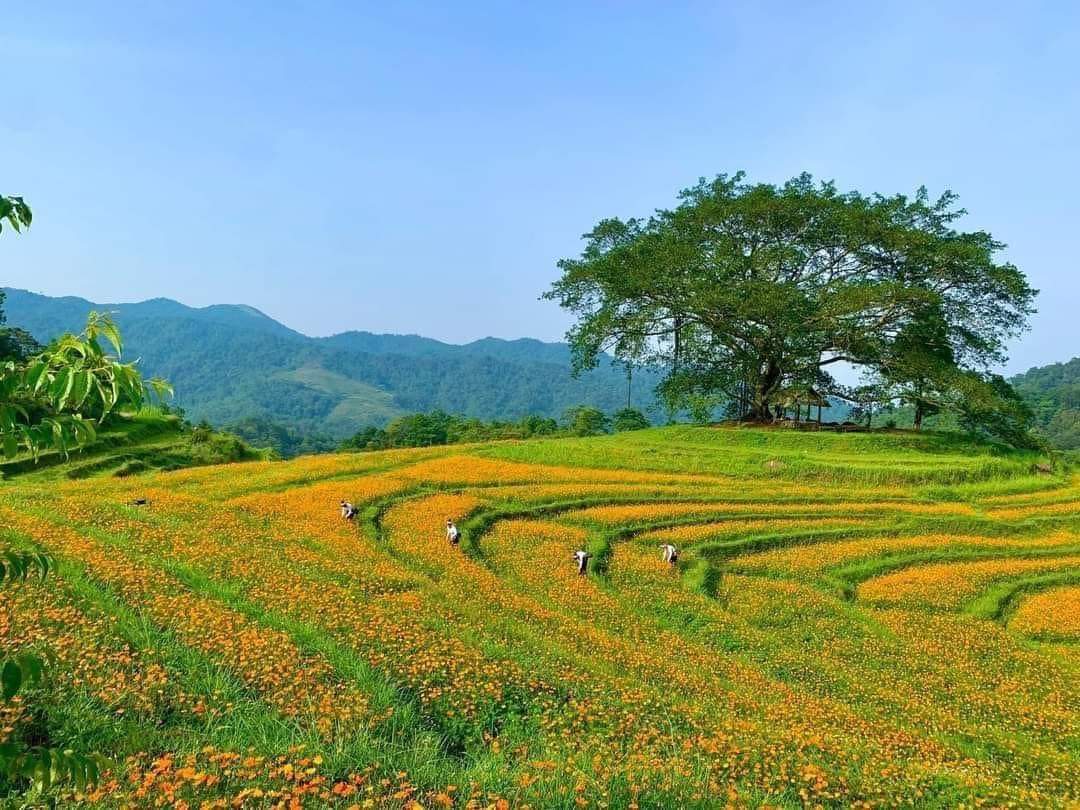(HBO) – Developing the economy in harmony with protecting the environment, and rationally using natural resources are consistent views in the development orientations of sectors, fields, and the northern province of Hoa Binh.
Mung homlet, Hop Phong commune (Cao Phong) is an attractive tourist destination.
Over the years, thoroughly grasping the direction of the Central Government,
the province has improved the state management capacity on environmental
protection. The inspection and examination focus on the compliance with the
contents of the environmental impact assessment report, investing in upgrading
the waste treatment system, registering the profile of the waste source owners,
granting permits for wastewater discharge, and annual environmental monitoring
reporting regime. As a result, the awareness of all levels, branches, agencies,
units, and people about environmental protection has been raised.
Resources for socio-economic infrastructure development associated with
environmental protection have helped improve people's lives in urban and rural
areas.
However, the process of socioeconomic development causes
environmental pollution that is difficult to solve. In addition, the province
is facing problems due to climate change, droughts, natural disasters, and
landslides, which seriously affect the safety of people's lives.
The Resolution of the 17th provincial Party Congress, action
programmes, key tasks, and breakthroughs have determined the viewpoint that
socioeconomic development must be associated with environmental protection,
economic development based on science technology, and innovation, industrial
development serves as the driving force, tourism as the spearhead,
commodity-producing agriculture and high-tech as the basis, harmonious and
modern transport infrastructure system, and the development of modern smart
urban system/green city associated to improve the people’s material and
spiritual life.
The province’s planning, infrastructure development, investment attraction,
service industry development, and tourism clearly show the province’s goal of
green and sustainable development.
In a meeting with provincial leaders, Prime Minister Pham Minh Chinh asked the
province to prioritise resources for the development of a green, digital and
circular economy in association with its potential, strengths, outstanding
opportunities, and competitive advantages.
Hoa Binh must pay great attention to ensuring harmony between
economic development, cultural social development, and ecological environmental
protection, along with defense and security.
The province was also asked to effectively and sustainably protect, develop and
use forests, especially protection and special-use ones. It was asked to do
research and effectively implement forest carbon services in the province.
In the master plan for 2050, the province will focus on four core pillars:
processing; higher-value manufacturing; agribusiness, tourism; and satellite
housing development.
The province plans to attract investment to areas with
advantages of natural landscape and environment such as Hoa Binh lake,
districts of Mai Chau, Lac Thuy, Kim Boi, Lac Son, and Yen Thuy. Hoa Binh is striving to become a high-class resort destination
in domestic and international markets. The province gives priority to the development of
environmentally friendly industries, and industrial development is linked with
urban development. Regarding agriculture and forestry, the province eyes clean and
green agriculture, and organic agriculture associated with the consumption
market, particularly Hanoi.
In addition, the province has been asked to effectively
implement tasks relating to planning, management, and use of land and minerals;
and to strictly control the environmental impact assessment for investment
projects.
Hoa Binh targets to gradually raise the community's awareness of
climate change, proactively respond to climate change’s impacts; and control
and manage industrial waste, domestic waste, medical waste, and emissions in
industrial production, transportation, and construction.
Other
key tasks include ensuring water security, strengthening the inspection of the
implementation of the Law on Environmental Protection, and strictly and
promptly handling violations./.



